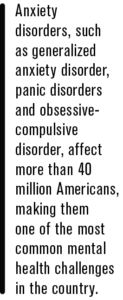The fast-paced world of real estate can provoke stress and anxiety. From the pressure of closing deals to the uncertainty of the market, real estate professionals are often faced with situations that can trigger anxiety.
Anxiety often stems from the fear of the unknown and a sense of lack of control over outcomes. Ignoring anxiety can lead to burnout, reduced professional performance and even health issues. Therefore, acknowledging the signs of anxiety—such as excessive worry, difficulty concentrating, irritability or a change in sleep patterns—is the first step toward management.
Recognizing and managing workplace anxiety is crucial for career longevity and personal well-being. Whether you’re an experienced agent or just starting in the industry, these tips will help you navigate work-related stress and manage some of the symptoms you might encounter.
Practical strategies to tackle anxiety
1. Start your day mindfully. Begin each day with a mindful practice such as meditation or deep breathing exercises. These practices can help you start your day with a calmer, more balanced approach, leading to a positive outlook on completing your daily real estate tasks.
2. Identify your triggers. Keepa journal or use voice noteson your phone to track situations that provoke anxiety, such as difficult clients or certain process steps. You might be able to avoid certain triggers, or if you can’t, at least prepare by reminding yourself that you have survived a similar situation before and will again.
 3. Organize your tasks. Use organizational tools like planners and calendar apps to tackle the “overwhelm.” Prioritize tasks according to urgency and importance—some client communications can wait for other more important items to be completed. This visual representation of your workload can help you manage time and decrease stress.
3. Organize your tasks. Use organizational tools like planners and calendar apps to tackle the “overwhelm.” Prioritize tasks according to urgency and importance—some client communications can wait for other more important items to be completed. This visual representation of your workload can help you manage time and decrease stress.
4. Cultivate a supportive network. Build relationships with other agents, staff or vendors who can offer support. Engaging with a mentor or joining a real estate professionals’ group to share experiences can make you feel less isolated in your struggles.
5. Embrace transparency with clients. Set realistic expectations about timelines and potential challenges with your clients, like inspections and the closing process. Being transparent builds trust and helps manage both your and your clients’ anxiety.
6. Take breaks to disconnect. Short, frequent breaks throughout the day can help reset your focus. Step away from your desk, go for a walk or do a short stretching routine to alleviate tension.
7. Plan for and practice responding vs. reacting. Stressors will pop up, so learn how to best handle them. When confronted with a stressful situation, like an unhappy client or an issue with a transaction, give yourself a moment to breathe and think before responding. This small pause can mean the difference between a panicked reaction and a thoughtful response.
8. Seek professional help. If anxiety starts to interfere with your work or personal life, consider talking to a mental health professional. Cognitive-behavioral therapy and other counseling techniques have been shown to be highly effective for anxiety.
The role of companies in supporting employees
Real estate companies can support their agents by recognizing the stressful nature of the work and providing resources to cope with anxiety. This could include:
- Offering access to mental health days and resources.
- Organizing wellness workshops and professional development sessions focused on stress management.
- Encouraging a company culture that values work-life balance and sets realistic expectations for employees.
- Providing access to resources such as employee assistance programs or mental health benefits.
Photo: Getty Images/Delmaine Donson








